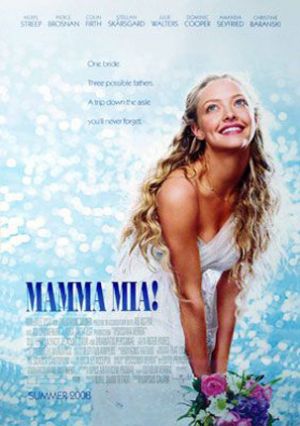
That the two biggest chick flicks of the decade contain subtle allusions to the economic recession should be wholly implausible, but where the Sex and the City film was a climactic exhibition of material excess in the face of the credit crunch, Mamma Mia retorts with a “make do and mend” attitude familiar to the older generation, gently ridiculing its sole socialite and her moisturiser containing “flakes of 24 carat gold and extract of donkey testicle, at $1000 a dollop”. That’s not to say it constitutes cutting edge social commentary by any stretch of the imagination – it’s a film so saccharine and wholesome that the off-key singing of the protagonists is as close at it gets to gritty realism. In case you’re blissfully unaware of the plot, wide-eyed and fatherless Sophie (a spry Amanda Seyfried) is getting married to Sky (Dominic Cooper, who’s about as dreamy and exotic as an Any Dream Will Do contestant), and using covert information gleaned from her mother’s diary, has invited along the three men who could potentially be her father. Cue hilarious conversations at cross purposes and far too much menopausal camel toe for anyone in their right mind to stomach, all to the tune of ABBA’s finest…
There’s a great deal to loathe about this film (not least the soundtrack if you’re not an ABBA fan), from the horrible soft-focus cinematography to the repetitive pratfalls into the glorious Mediterranean, and the pithy script (particularly Pierce Brosnan’s polemic about respecting the rights of the father). The casting is as off-key as the singing – Colin Firth is so embarrassingly unconvincing as a gay man that come the end of the film, the director included an apologetic slow-mo homage to Pride and Prejudice where the abundance of wet-shirted men is in direct inverse proportion to the amount of sex appeal Firth exudes here. It suffers a lack of balance, dedicating little time to the relationship between Sky and Sophie (although we should be grateful for small mercies – their relationship makes that of Troy and Vanessa from High School Musical look transcendent and intense), and its only success at subtly acknowledging Greek mythology (shoehorned in by director Phyllida Lloyd at every opportunity) comes with faintly disturbing shades of the Electra complex that Sophie threatens to develop against Donna pre-wedding.
However (and it’s an extremely begrudged however), Mamma Mia’s greatest success lies in its impeccable knowledge of its target audience – the older generation (or the “BBC crowd” as the film’s marketing manager labelled them)- and part of the film’s indirect charm is to see largely senior audiences one minute acting giddy as school girls (you’ve never heard anything like the screams when the male contingent appear in shiny blue leotards), the next empathising with Donna’s self-confessed technophobia, then cooing with grandmotherly affection as the youth make impassioned decisions. It’s visually addictive HRT, and an older crowd will appreciate a cast that’s not American by majority.
Your average teenager understands that singing in front of people is a mortifying pastime reserved for delusional X Factor contestants, public displays of affection are for saps, and that you should never trust a girl who says her mother is her best friend - but for the older generation, the sentimental decency of the plot recalls a time when entertainment came from making the best of what you had, and not compensating for emotional voids with capricious capitalism. It’s good clean fun, with old favourite Julie Walters delivering the film’s sharpest and most risqué line – when discussing Donna’s sex life in a cringeworthy scene starring a power drill (no prizes for interpreting that metaphor), she upholds that “it’s just more plumbing to be maintained”, and often steals the show with her wired delivery and unabashed willingness to send herself up in the stickiest of situations.
Only people who bandy about the word “trendy” could ever see this film as cool, but happily, the film never pretends to be anything of the sort. It’s a self-indulgent and undignified farce, but the original ingenuity of the ABBA-led narrative still shines through, despite the gaping plot error (the oldies reminisce about flower power and the good old days, making Pierce Brosnan a latent hippy, or Sophie the world’s youngest-looking 39 year old). Where Sex and the City failed to emphasise the so-called empowerment of feminist, liberated modern women, Mamma Mia thrives by discouraging subordination to a life of domesticity and emotional materialism, promoting independence, and self-discovery. Which, when you think about it, is far cooler than desperately chasing romance and $250 cushions…
8 August 2008
Mamma Mia
Posted by
Künstlicher
at
16:56
![]()
Subscribe to:
Post Comments (Atom)




No comments:
Post a Comment